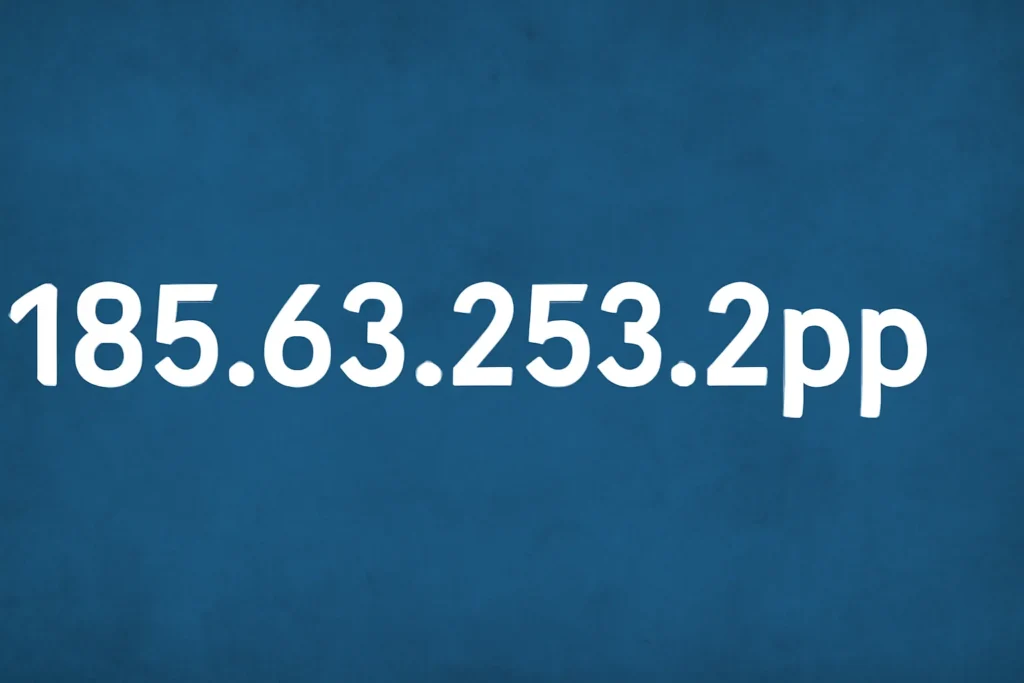Introduction
In today’s world of digital communication, security is one of the most critical aspects of internet usage. You’ve likely encountered different IP addresses, some of which might raise concerns. One such IP address is 185.63.253.2pp. But what exactly is 185.63.253.2pp, and why should you care about it?
In this blog post, we will break down everything you need to know about 185.63.253.2pp, its meaning, how to protect your network from any risks associated with it, and how you can safeguard your data and online presence.
What is an IP Address?
Before we delve deeper into 185.63.253.2pp, let’s quickly go over what an IP address is. An Internet Protocol (IP) address is a unique identifier assigned to every device connected to a network. It helps devices communicate with each other over the internet or a local network. Essentially, it’s like a postal address for your device in the digital world.
There are two types of IP addresses: IPv4 and IPv6. 185.63.253.2pp is an example of an IPv4 address, which is commonly used today for identifying devices across the internet.
Significance of 185.63.253.2pp
When you see 185.63.253.2pp, it can be a bit alarming, especially because of the “pp” suffix. The “pp” suffix usually indicates a potential issue or misconfiguration in the IP address. However, it’s important to understand how to evaluate the situation properly.
Origin of 185.63.253.2pp
-
Network Misconfiguration: The inclusion of “pp” could point to an issue with how the network is configured. It might be the result of a malfunction in network routers, firewalls, or other networking equipment. Such errors often lead to confusion, especially if the IP address is mistakenly flagged as malicious.
-
Potential Security Threat: Another possibility is that the “pp” is being added to an IP address for purposes of network obfuscation. Attackers sometimes modify IP addresses in this manner to avoid detection by traditional network security tools.
-
ISP Assignments: In some cases, internet service providers (ISPs) may assign ranges of IP addresses for specific services or purposes. If 185.63.253.2pp appears within such a range, it could be part of an allocated resource that hasn’t been properly labeled.
Is 185.63.253.2pp Safe?
Determining the safety of 185.63.253.2pp depends largely on the context in which it’s encountered. Here are some essential considerations:
-
Check for Malware or Intrusions: If this IP address appears in your network logs, and you don’t recognize it, it’s worth investigating. Run a full malware scan on all connected devices to ensure that no malicious activity is taking place.
-
Use Reliable Security Tools: Security software tools, such as firewalls or network monitoring software, can help identify whether this IP is linked to harmful activity. Tools like Wireshark or IP location services can also provide more context about the IP.
-
Check Public Databases: You can use public databases like WHOIS to find the registration details of the IP address. This can help you identify whether it belongs to a legitimate provider or a potential threat.
How to Protect Your Network from IP Address Threats?
If you suspect that an unknown IP address, like 185.63.253.2pp, is affecting your network, here are a few steps you can take to ensure your security:
1. Install a Robust Firewall
A firewall acts as a barrier between your internal network and external sources. Configuring your firewall to block any suspicious or unknown IP addresses can provide an additional layer of protection. Regularly update your firewall rules to prevent unwanted traffic from entering your network.
2. Utilize Intrusion Detection Systems (IDS)
Intrusion Detection Systems (IDS) monitor network traffic for any unusual behavior that might indicate a security threat. These systems can detect malicious activity, alert you to potential threats, and help you react quickly to safeguard your network.
3. Regular Software Updates
Keep all your devices, including your routers and firewalls, up to date with the latest security patches. Outdated software can expose your network to vulnerabilities that attackers may exploit. Make sure to regularly check for updates and apply them promptly.
4. Encrypt Your Network Traffic
Encryption is a key element of maintaining online privacy. By using VPNs (Virtual Private Networks), your internet traffic is encrypted, preventing anyone from intercepting and spying on your data, including those using suspicious IP addresses like 185.63.253.2pp.
5. Block Suspicious IPs
If you identify that an IP address is malicious or causing trouble, it’s a good idea to block it. You can do this manually via your router’s configuration settings or using third-party security tools.
How to Identify Malicious IP Addresses?
Being able to identify potentially malicious IP addresses is essential for online security. Below are some common signs that an IP address, like 185.63.253.2pp, may not be safe:
-
Unusual network activity: If you notice a spike in unusual traffic or data packets, it could be a sign that a particular IP address is involved in an attack.
-
Reputation scores: Many services provide reputation scoring for IP addresses. If 185.63.253.2pp has a poor score or is listed on blacklists, it might be involved in malicious activity.
-
Geolocation issues: Sometimes, IP addresses from unexpected locations can indicate suspicious activity. For instance, if your server is based in one country but traffic is coming from a high-risk region, this could be a red flag.
Conclusion
As technology continues to evolve, so do the threats that can compromise our online security. The IP address 185.63.253.2pp may be one of the many that pose a risk to your network, but with the right tools and practices, you can protect yourself from potential damage.
By regularly monitoring network activity, using strong security software, and keeping your devices up to date, you can ensure your data remains secure and your online experience stays safe.
Frequently Asked Questions
1. What does the “pp” mean in 185.63.253.2pp?
The “pp” suffix is usually an indication of network misconfiguration or manipulation. It is not a standard part of an IP address and might suggest a security concern.
2. How do I know if 185.63.253.2pp is a threat?
To determine if this IP is a threat, you should check its reputation through IP databases, monitor network traffic for suspicious activity, and use security software to scan for malware.
3. Can I block 185.63.253.2pp from my network?
Yes, if you identify that this IP is harmful, you can block it via your router or using third-party security tools.
4. Is 185.63.253.2pp linked to hacking or malware?
There is no definitive evidence to suggest that 185.63.253.2pp is universally associated with hacking or malware. However, it is important to monitor any unfamiliar IP addresses for signs of malicious activity.
5. Should I report suspicious IPs like 185.63.253.2pp?
Yes, if you suspect that an IP address is malicious, reporting it to your ISP or using blacklisting services can help protect others from potential threats.



